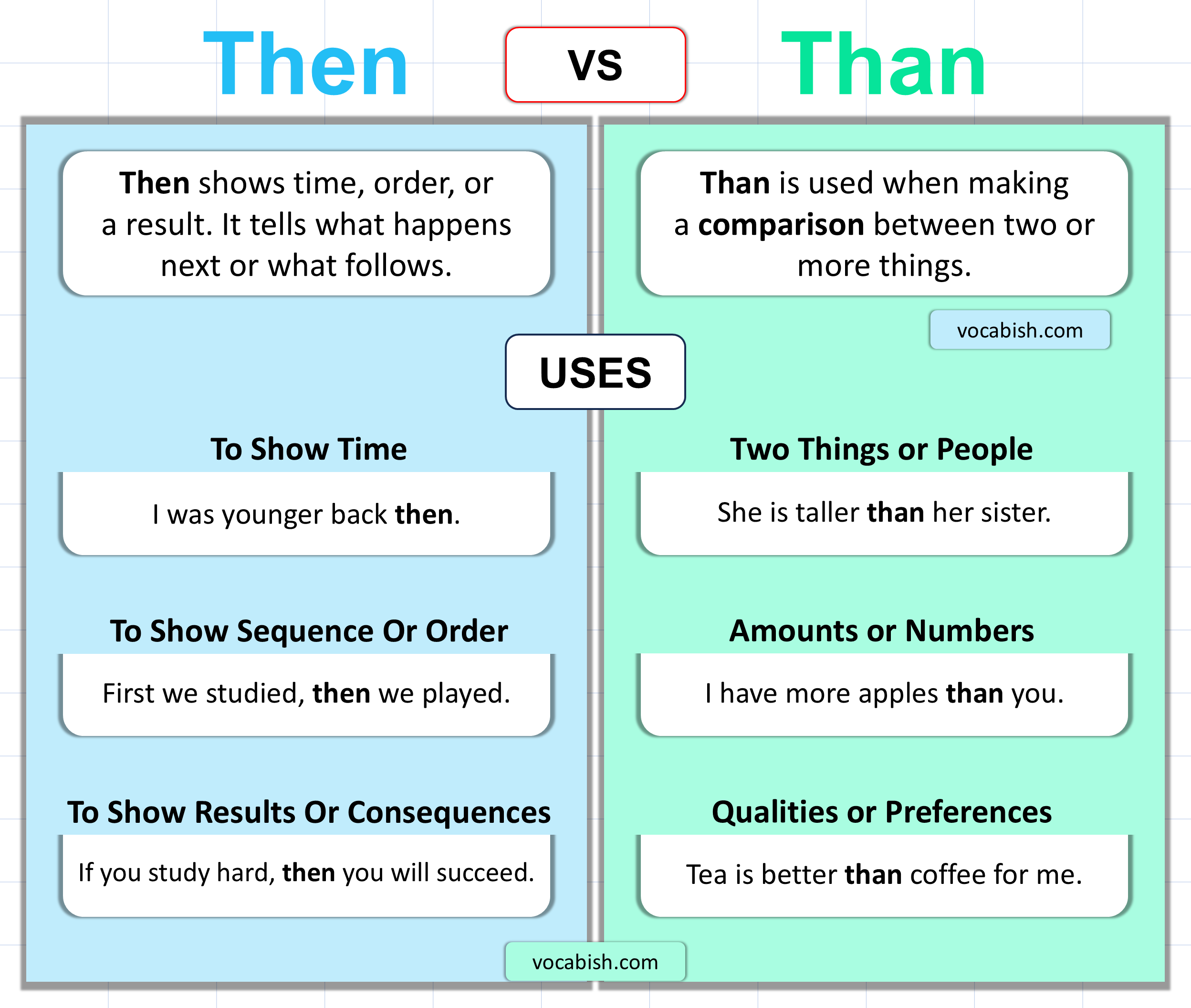In this blog post, you will learn the difference between then and than. These two words look and sound similar, but they have different meanings and uses in English. Many learners confuse them because one relates to time or sequence, while the other is used for comparisons. When you understand how to use each word correctly, you can avoid common mistakes and communicate more clearly in writing and speaking. Knowing the difference will also improve your reading, listening, and overall language skills. Keep reading to master their correct usage with helpful examples.
You can explore our 100 confusing words list to expand your vocabulary skills!
What is Then vs Than?
The words Then and Than are homophones, which means they sound alike but have different meanings and functions in English sentences.
Meanings of Then and Than
Then
Then shows time, order, or a result. It tells what happens next or what follows. It is commonly used when talking about sequence or consequences.
For Example:
- We finished our homework and then watched TV.
- If it rains, then we will stay home.
- Back then, people didn’t use smartphones.
Than
Than is used when making a comparison between two or more things. It helps show differences in quality, amount, or degree.
For Example:
- My house is bigger than yours.
- She runs faster than her friend.
- This book is more interesting than that one.
Differences Between Then and Than
| Feature | Then | Than |
|---|---|---|
| Meaning | Refers to time or result | Used for comparison |
| Part of Speech | Adverb | Conjunction / Preposition |
| Common Use | Talking about what happens next | Comparing two things |
| Example | We’ll go to the shop and then home. | He’s taller than me. |
- Then = Time or Order
- Than = Comparison
Usage of Then
Use Then in the following cases:
1. To show time
I was younger back then.
2. To show sequence or order
First we studied, then we played.
3. To show results or consequences
If you study hard, then you will succeed.
Usage of Than
Use Than when you are comparing:
1. Two things or people
She is taller than her sister.
2. Amounts or numbers
I have more apples than you.
3. Qualities or preferences
Tea is better than coffee for me.
Formal and Informal Uses of Then and Than
| Context | Then | Than |
|---|---|---|
| Formal | If your work is complete, then submit it. | The results are better than expected. |
| Informal | Let’s eat and then go for a walk. | She’s smarter than him. |
- Then is often used in daily conversations, instructions, and storytelling.
- Than is mostly used in comparisons, both formal and informal.
Example Sentences with Then
- We went shopping and then had lunch.
- If it rains, then we will stay inside.
- He looked at me and then smiled.
- First wash your hands, then eat.
- I’ll call you then.
- Back then, life was simpler.
- Finish your homework and then play.
- She left and then returned later.
- We studied, then took the test.
- He waited, then walked away.
Example Sentences with Than
- This dress is prettier than that one.
- He works harder than anyone else.
- It’s colder today than yesterday.
- She is more confident than before.
- My room is larger than yours.
- I’d rather read than watch TV.
- He runs faster than me.
- The movie was better than expected.
- You are stronger than you think.
- English is easier than French for me.
FAQs on Then vs Than
What is the main difference between Then and Than?
Then talks about time or order, while Than is used for comparison.
Can Then and Than be used in the same sentence?
Yes! Example: If you study more than before, then you’ll pass easily.
What part of speech are Then and Than?
Then is mainly an adverb, and Than is a conjunction or preposition.
How can I remember the difference easily?
Remember: Then = Time (both have “e”), and Than = Comparison (both have “a”).
When to use Then vs Than?
Use Then when you are talking about time, order, or result — for example, First study, then play.
Use Than when you are making a comparison — for example, She is taller than him.
The words Then and Than may look and sound similar, but their meanings are completely different.
Use Then when talking about time, sequence, or result, and use Than when comparing two or more things.
Read More

